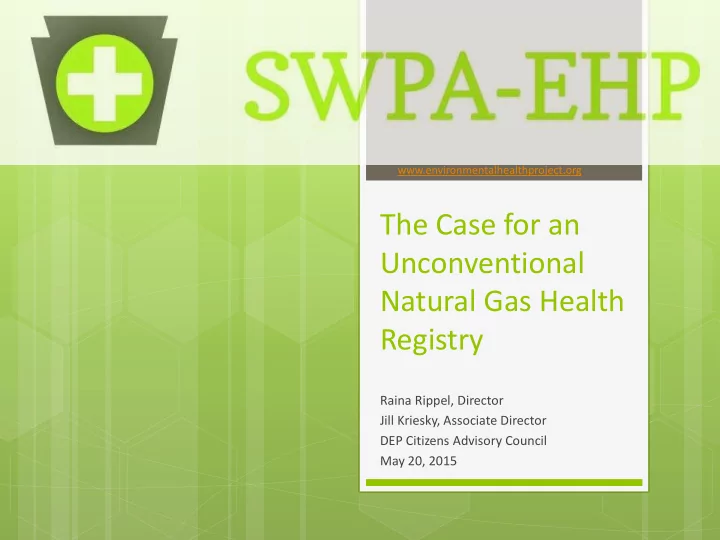

www.environmentalhealthproject.org The Case for an Unconventional Natural Gas Health Registry Raina Rippel, Director Jill Kriesky, Associate Director DEP Citizens Advisory Council May 20, 2015
724.260.5504 EHP Team Raina Rippel, BA – Director Norman Anderson, MPH – Environmental Health Consultant David R. Brown, ScD – Environmental Health Consultant Jessa Chabeau, MSW – Case Manager Lydia Greiner, BSN, MSN – Psychiatric Nurse Practitioner Ryan Grode, BS – Environmental Health Educator Michael Thorne Kelly, PhD – Strategic Planning Consultant Jill Kriesky, MS, PhD – Associate Director Celia Lewis, MS.ED, PhD – Research and Communications Consultant Carole L. Perry, RN, PhD – Nurse Educator Lenore K. Resick, PhD, CRNP, FNP-BC – Family Nurse Practitioner Leslie Walleigh MD, MPH – Medical and Occupational Health Consultant Beth Weinberger, MPH, PhD – Research and Communications Consultant
724.260.5504 Our mission is to respond to individuals’ and communities’ need for access to accurate, timely and trusted public health information and health services associated with natural gas extraction.
724.260.5504 The Southwest Pennsylvania Environmental Health Project Health Evaluations Accurate, Trusted and Timely and Support Public Health Information Nurse Practitioner Identification of exposure pathways Health assessments Measurement tools Consultations Consultation on water Referrals for health services reports Health Provider education Assessment of air Clinical toxicity profiles exposures Evaluation of health risks
724.260.5504 Ch. 78a Comments Submitted 5.19.15 EHP’s five primary concerns with respect to the proposed revision of Chapter 78a are below. Each point seeks to strengthen the DEP’s role in protecting health in the context of shale gas development: 1. Allowing gas development (well sites as well as other industrial activities) near schools puts children at risk. As currently written, proposed revisions to Chapter 78a do not protect school children from harm. 2. Noise mitigation must be adequate to protect nearby residents and must include compliance oversight by the DEP. 3. Emergency planning is insufficient to protect those living, working, or going to school near shale gas development sites. 4. Centralized tank storage sites should be at a health protective distance from schools, their parks and playgrounds. 5. Regulation addressing the emissions from compressor stations, metering stations, and processing plants are absent. These facilities produce emissions that can reach nearby homes.
724.260.5504 What Is a Health Registry? Some are designed to monitor the incidence and prevalence of well-understood diseases Some serve as a surveillance system for the occurrence of unexpected/harmful events resulting from products and (often medical) services Some shed light on an incompletely understood disease or constellation of health conditions that appear to have the same origin; define associations between environmental exposures and adverse health events
724.260.5504 Why Do We Need One? Inconsistent documentation of illness plausibly linked to UNGD Gaps in knowledge about the full range of exposures Need to find responses to individuals exposed to contaminants at their homes, schools, and workplaces
724.260.5504 EHP’s Activities to Promote Health Registry February 2014 meeting of academics (University of Pittsburgh, University of Pennsylvania, University of CO) and NGOs (EHP, Earthworks Oil & Gas Accountability Project, Physicians, Scientists, & Engineers for Healthy Energy) Preparation of “The Case for an Unconventional Natural Gas Development Health Registry” white paper in fall 2014 Two-day invited workshop designed to address questions raised in the white paper held May 4 & 5, 2015, in Chicago, IL
724.260.5504 24 participants at the May 4-5 meeting included: Public health department reps from PA, MD, CO, & CA Academics from universities in MA, NY, CA, WV, PA, & CO NGO representatives from DC, NY, PA, CT, ME, OH & WY National federal agency (NIEHS) The areas of expertise of participants: Medical (physicians, nurse practitioners) Toxicology Epidemiology (including health registries) Air and water emissions Community outreach/organizing
724.260.5504 Major Points of Agreement in the Workshop: As health symptoms collected appear non-specific and emissions measurements are incomplete, probably too soon for a registry despite significant concern for potential short and long run health impacts Efforts should be made to “roster” as many individuals with plausible exposures as possible for future research Health and emissions data going forward should be collected in a standardized form across all states
724.260.5504 Follow Up Steps for Workshop Attendees Provide the Colorado Department of Public Health and Environment recommendations for easily replicable roster of callers to a new statewide hotline; Initiate discussions of a roster to be developed/administered by trusted NGOs with regional/national expertise Serve as a sounding board for CDC’s National Environmental Public Health Tracking Network special topics task force on the health impacts of UNGD. Offer EHP suggestions to strengthen its first draft of a case description of health impacts from UNGD exposure.
724.260.5504 Next Steps for EHP on Health Registry Workshop Provide a summary of the workshop discussion to participants Revise white paper to incorporate recommendations from workshop and submit for publication Widely disseminate revised white paper to public health agencies at all governmental levels Provide leadership/communications on workshop “next steps”
724.260.5504 Thank you very much for your time For more information www.environmentalhealthproject.org 724.260-5504 info@environmentalhealthproject.org
Recommend
More recommend